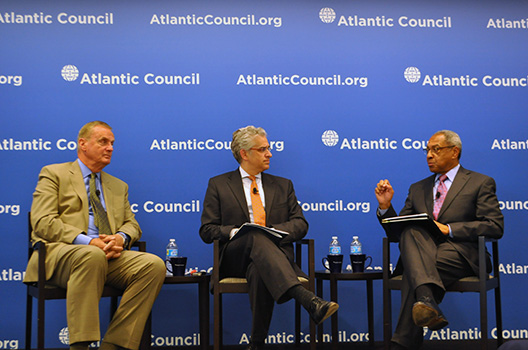 On July 22, the Atlantic Council held a report rollout for a report by the Combatant Command Task Force, chaired by retired General James J. Jones, Jr., called “All Elements of National Power: Moving Towards a New Interagency Balance for US Global Engagement.”
On July 22, the Atlantic Council held a report rollout for a report by the Combatant Command Task Force, chaired by retired General James J. Jones, Jr., called “All Elements of National Power: Moving Towards a New Interagency Balance for US Global Engagement.”
In his remarks, Jones emphasized the importance of developing a strategy for US national engagement in the twenty-first century. In the past, civilian-military institutions were able to respond to challenges as they arose, but the novel challenges faced in our time require a new approach. The main focus of the report was to look at regional combatant commands and determine whether they are sufficient in facing the issues present in the modern realm. And the conclusion is no–as the pace of the challenges and threats has changed, the institutional structures and approaches have fallen behind.
A new, whole-of-government approach to combatant commands would enable the United States to improve the execution of foreign and defense policy overseas in a rapidly changing world with asymmetric threats–such as nonstate actors—economic instability, and energy security challenges. General Jones focused on the importance of developing a regionally-focused strategy that would deal with all of these challenges while also still keeping a military presence. This would increase the flexibility and speed of US responses to threats, which is crucial in today’s world. Indeed, it would allow the United States to be more proactive rather than reactive. Finally, to enforce the new notion that these commands are less militaristic, the name of these institutions should be changed to “Unified Regional Commands.”
Scowcroft Center Vice President and Director Barry Pavel and former Assistant Secretary of State for African Affairs George Moose joined General Jones on stage after his speech. Ambassador Moose agreed with the importance of reconsidering a regional presence, mentioning that a broader perspective is critical to US success abroad. Currently, civilian institutions are lacking and the potential the State Department has to affect good change abroad is not yet realized. A more overarching approach and increased accountability could lead to greater results, but redefining roles requires more resources, enhanced capabilities of involvement, and solving cultural and governmental barriers. The issue of information sharing was also raised, and both panelists recognized its transformational power – reforming this fundamental element could rapidly improve the efficiency of coherently communicating US foreign policy abroad.
